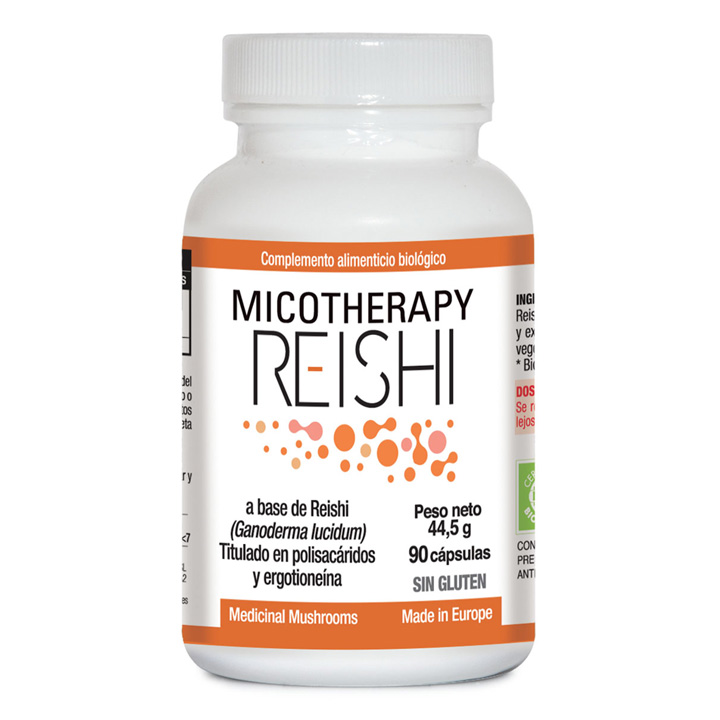
Complemento alimenticio a base de Reishi (Ganoderma lucidum) procedente de agricultura ecológica (IT BIO 006) – Hecho en Europe.
Propiedades:
También llamado «Hongo de la eterna juventud» y «Hongo de la inmortalidad», Reishi se considera tradicionalmente un remedio útil para restablecer el equilibrio del organismo, ayudando a mejorar la resistencia a las enfermedades.
Efecto fisiológico:
Reishi es un hongo en el que se han aislado numerosos compuestos bioactivos que explican particularmente sus funciones; los más relevantes son: polisacáridos, en particular beta-glucanos, glucoproteínas, triterpenos, esteroles, aminoácidos, nucleósidos, vitaminas y minerales, incluido el germanio en grandes cantidades. Gracias a sus propiedades, Reishi ayuda a regular y fortalecer el sistema inmunológico. También tiene una acción calmante natural, ayudando a mejorar la capacidad de manejar el estrés psicofísico.
Ingredientes:
- Reishi (Ganoderma lucidum) de agricultura ecológica, hongos enteros en polvo y extracto seco (tit. 25% en polisacáridos)
Dosis recomendada:
Una cápsula 3 veces al día, preferiblemente lejos de las comidas
Presentación:
Envase de 90 cápsulas
Conservación y registro:
Conservar el producto en un lugar fresco y seco resguardado de la luz solar y de fuentes de calor
Código Nacional 196793.0
Libre de Gluten
![]() producto certificado Play Sure-Doping Free
producto certificado Play Sure-Doping Free
Producto certificado de agricultura ecológica (IT BIO 006) – Hecho en Europa
| CONTENIDO MEDIO DE LOS INGREDIENTES CARACTERIZADORES | POR DOSIS DIARIA (3 CAP) |
| Reishi extracto seco | 960 mg |
| Aporte de polisacáridos | 240 mg |
| Reishi hongo entero | 240 mg |
Bibliografia:
- Zhou, Sh.; Gao, Y. The immunomodulating effects of Ganoderma lucidum (Curt.: Fr.) P. Karst. (Ling Zhi, reishi mushroom) (Aphyllo- phoromycetideae). Int. J. Med. Mushrooms 2002, 4 (1), 1–11
- Liu, G.T. Recent advances in research of pharmacology and clinical applications of Ganoderma P. Karst. species (Aphyllophoromycetideae) in China. Int. J. Med. Mushrooms 1999, 1 (1), 63–68
- Ko, H-H., H. Chi-Feng, J-P. Wang & C-N. Lin, 2008. “Antiinflammatory triterpenoids and steroids from Ganoderma lucidum and G. tsugae.” Phytochemistry Volume 69, Issue 1, January, Pages 234-239
- TV Lasukova, AG Arbuzov, LN Maslov, and VN Burkova. Ganoderma lucidum extract in cardiac diastolic dysfunction and irreversible cardiomyocytic damage in ischemia and reperfusion of the isolated heart. Patol Fiziol Eksp Ter, Jan 2008; (1): 22-5
- Zhang HN, Lin ZB (2004). Hypoglycemic effects of Ganoderma lucidum polysacchrides.Acta Pharmacol. 25 (2):191-195
- Tang W, Gao Y, Chen G, et al. A Randomized, Double-Blind and Placebo-Controlled Study of a Ganoderma lucidum Polysaccharide Extract in Neurasthenia. J Med Food. 2005;8:53-58
- R Zhang, S Xu, Y Cai, M Zhou, X Zuo and P Chan. Ganoderma lucidum Protects Dopaminergic Neuron Degeneration Through Inhibition of Microglial Activation. eCAM Advance Access published July 16, 2009
- ZY Zhou, YP Tang, J Xiang, P Wua, HM Jin, Z Wang, M Mori, and DF Cai. Neuroprotective effects of water-soluble Ganoderma lucidum polysaccharides on cerebral ischemic injury in rats. J Ethnopharmacol, August 19, 2010; 131(1): 154-64
- B Lakshmi, TA Ajith, N Jose, and KK Janardhanan Antimutagenic activity of methanolic extract of Ganoderma lucidum and its effect on hepatic damage caused by benzo[a]pyrene. J Ethnopharmacol, September 19, 2006; 107(2): 297-303
- Y Shi, J Sun, H He, H Guo, and S Zhang. Hepatoprotective effects of Ganoderma lucidum peptides against D-galactosamine-induced liver injury in mice. J Ethnopharmacol, May 22, 2008; 117(3): 415-9
- YQ Li and SF Wang Anti-hepatitis B activities of ganoderic acid from Ganoderma lucidum. Biotechnol Lett, June 1, 2006; 28(11): 837-41
- Zhou, Sh.; Gao, Y.; Chen, G.; Dai, X.; Ye, J.;Gao, H. A phase I=II study of a Ganoderma lucidum (Curt.: Fr.) P. Karst. (Ling Zhi, Reishi mushroom) extract in patients with chronic hepatitis B. Int. J. Med. Mushrooms 2002, 4 (4), 321–328
- Gao, Y.; Lan, J.; Dai, X.; Ye, J.; Zhou, Sh. A phase I/II study of Ling Zhi mushroom Ganoderma lucidum. (W. Curt.: Fr.) Lloyd (Aphyllophoromycetideae) extract in patients with type II diabetes mellitus. Int. J. Med. Mushrooms 2004, 6 (1)
- Dott. Martin Powell. The Use of Ganoderma lucidum (Reishi) in the Management of Histamine-Mediated Allergic Responses. Nutrition Practitioner October 2004 (www.nutprac.com)
- Sone Y, Okuda R, Wada N, Kishida E, Misaki A. Structures and antitumor activities of the polysaccharides isolated from fruiting body and the growing culture of mycelium of Ganoderma lucidum. Agric Biol Chem 1985;49:2641–53
- Mao T, van De Water J, Keen CL, et al. Two mushrooms, Grifola frondosa and Ganoderma lucidum, can stimulate cytokine gene expression and proliferation in human T lymphocytes. Int J Immunother 1999;15(1):13-22
- Chan WK, Cheung CC, Law HK, et al. Ganoderma lucidum polysaccharides can induce human monocytic leukemia cells into dendritic cells with immuno-stimulatory function. J Hematol Oncol. 2008;1(1):9
- Gao Y, Zhou S, Jiang W, et al. Effects of ganopoly (a Ganoderma lucidum polysaccharide extract) on the immune functions in advanced-stage cancer patients. Immunol Invest. Aug 2003;32(3):201-215
- HY Hsu, KF Hua, WC Wu, J Hsu, ST Weng, TL Lin, CY Liu, RS Hseu, and CT Huang. Reishi immuno-modulation protein induces interleukin-2 expression via protein kinase-dependent signaling pathways within human T cells. J Cell Physiol, Apr 2008; 215(1): 15-26
- Stanley G, Harvey K, Slivova V, Jiang J, Sliva D. Ganoderma lucidum suppresses angiogenesis through the inhibition of secretion of VEGF and TGF-_1 from prostate cancer cells. Biochem Biophys Res Commun 2005;330:46–52
- Free radical scavenging and immunomodulatory activities of Ganoderma lucidum polysaccharides derivatives.J Wang, Y Wang, X Liu, Y Yuan, and T Yue . Carbohydr Polym, January 2, 2013; 91(1): 33-8
para más información visite el sitio: www.micotherapy.it




